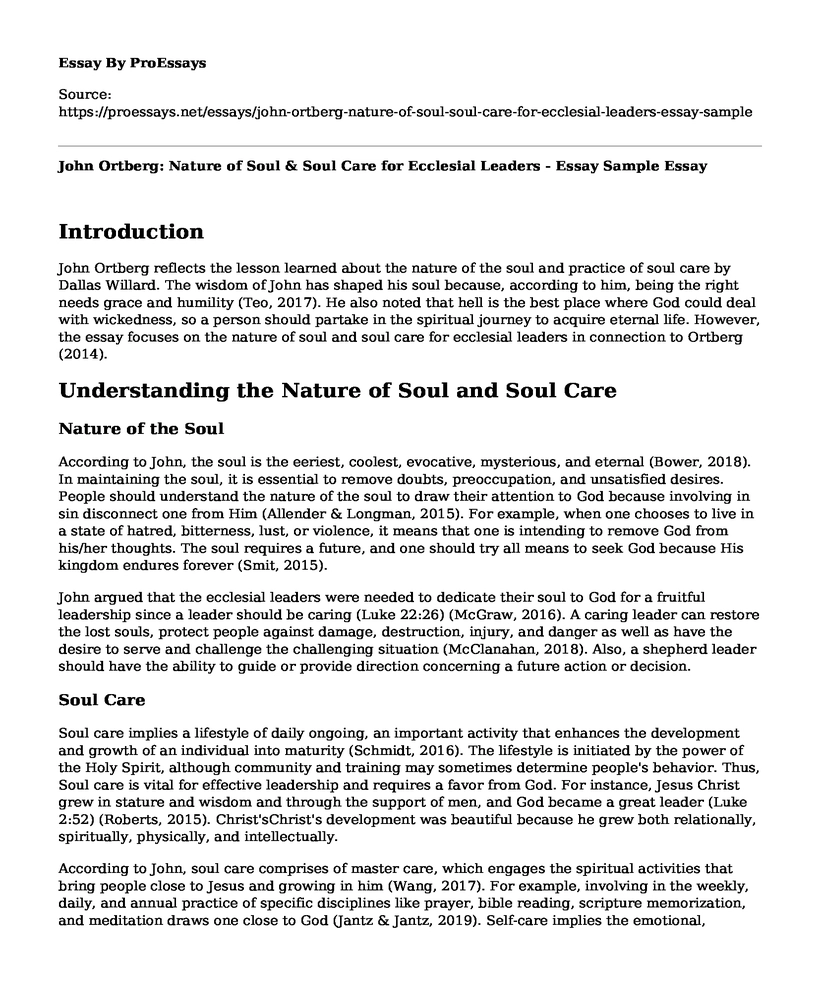Introduction
John Ortberg reflects the lesson learned about the nature of the soul and practice of soul care by Dallas Willard. The wisdom of John has shaped his soul because, according to him, being the right needs grace and humility (Teo, 2017). He also noted that hell is the best place where God could deal with wickedness, so a person should partake in the spiritual journey to acquire eternal life. However, the essay focuses on the nature of soul and soul care for ecclesial leaders in connection to Ortberg (2014).
Understanding the Nature of Soul and Soul Care
Nature of the Soul
According to John, the soul is the eeriest, coolest, evocative, mysterious, and eternal (Bower, 2018). In maintaining the soul, it is essential to remove doubts, preoccupation, and unsatisfied desires. People should understand the nature of the soul to draw their attention to God because involving in sin disconnect one from Him (Allender & Longman, 2015). For example, when one chooses to live in a state of hatred, bitterness, lust, or violence, it means that one is intending to remove God from his/her thoughts. The soul requires a future, and one should try all means to seek God because His kingdom endures forever (Smit, 2015).
John argued that the ecclesial leaders were needed to dedicate their soul to God for a fruitful leadership since a leader should be caring (Luke 22:26) (McGraw, 2016). A caring leader can restore the lost souls, protect people against damage, destruction, injury, and danger as well as have the desire to serve and challenge the challenging situation (McClanahan, 2018). Also, a shepherd leader should have the ability to guide or provide direction concerning a future action or decision.
Soul Care
Soul care implies a lifestyle of daily ongoing, an important activity that enhances the development and growth of an individual into maturity (Schmidt, 2016). The lifestyle is initiated by the power of the Holy Spirit, although community and training may sometimes determine people's behavior. Thus, Soul care is vital for effective leadership and requires a favor from God. For instance, Jesus Christ grew in stature and wisdom and through the support of men, and God became a great leader (Luke 2:52) (Roberts, 2015). Christ'sChrist's development was beautiful because he grew both relationally, spiritually, physically, and intellectually.
According to John, soul care comprises of master care, which engages the spiritual activities that bring people close to Jesus and growing in him (Wang, 2017). For example, involving in the weekly, daily, and annual practice of specific disciplines like prayer, bible reading, scripture memorization, and meditation draws one close to God (Jantz & Jantz, 2019). Self-care implies the emotional, intellectual, and physical parts of beings and engages the development of knowledge, self-awareness, self-discipline, and skills that nurture people (MacEwen, 2015). Accordingly, self-awareness involves personal calling, identity in emotions, thinking patterns, and ministry. Self-discipline deals with physical health like fitness, time management, diet and sleep/rest, and lastly, mutual care is minding the welfare of others. The practice of joint care shows the effectiveness of 'sone's soul care. Hence, John suggested that for effective leadership, the ecclesia leader needs soul care to avoid biasness when serving people in different organizations, become committed, and trustworthy (Porter, 2017).
Conclusion
Ortberg (2014) bases his work on the nature of soul and soul care for ecclesial leaders. An appropriate soul should strive to seek God's words and show total dedication in prayers. When a soul is attached to sin, it means one is disconnected from God. Therefore, a leader should be willing to trust God and behave like a shepherd in guiding, leading, protecting, and controlling people. For instance, if people detach their hearts in the gospel, it is the responsibility of the leader to renew their strength in worship and prayer.
References
Allender, D., & Longman, T. (2015). The cry of the soul: How our emotions reveal our deepest questions about God. NavPress.
Bower, B. D. (2018). Catalyzing Soul Care Mentoring among Young Leaders in France (Doctoral dissertation, Nyack College, Alliance Theological Seminary).
Jantz, G. L., & Jantz, G. L. (2019). Soul Care: Prayers, Scriptures, and Spiritual Practices for When You Need Hope the Most. Tyndale House Publishers.
MacEwen, L. G. (2015). The impact of a contextualized spiritual formation strategy for Korean Christians. Biola University.
McClanahan, J. (2018). Pastoral Self-Care: Developing a Burnout-Resistant Approach to Life and Ministry.
McGraw, D. A. (2016). Formulating an Intentional Curriculum for Spiritual Leadership Development at the West University Church of Christ.
Porter, S. L. (2017). Reflections on Ten Years of Publication. Journal of Spiritual Formation and Soul Care, 10(2), 133-137.
Roberts, G. (2015). Developing Christian servant leadership: Faith-based character growth at work. Springer.
Schmidt, J. (2016). Melancholy and the care of the soul: Religion, moral philosophy and madness in early modern England. Routledge.
Smit, G. H. (2015). Pastoral ministry in a missional age: Towards a practical theological understanding of missional pastoral care. Verbum et Ecclesia, 36(1), 1-8.
Teo, W. (2017). Christian spiritual formation. Emerging Leadership Journeys, 10(1), 138-150.
Wang, D. C. (2017). Mobilizing and Equipping the Church for Soul Care and Counseling: A Classic Resource Updated and Revised. Journal of Psychology and Theology, 45(2), 144-146.
Cite this page
John Ortberg: Nature of Soul & Soul Care for Ecclesial Leaders - Essay Sample. (2023, Feb 26). Retrieved from https://proessays.net/essays/john-ortberg-nature-of-soul-soul-care-for-ecclesial-leaders-essay-sample
If you are the original author of this essay and no longer wish to have it published on the ProEssays website, please click below to request its removal:
- The Morality of Suicide: The Divergent and Convergent Views
- What Are the Three Ethical Decision Criteria? Essay Example
- Delivering Negative News Essay
- Essay Sample on Impact of Live Action and Animation on Morality and Reality
- Ethics and Truth in Religion - Essay Sample
- Ethical Decision Making and Cases Paper Example
- Ethical Analysis of Marketing Practices: Locating Grocery Stores and Cigarette Pricing - Free Report







